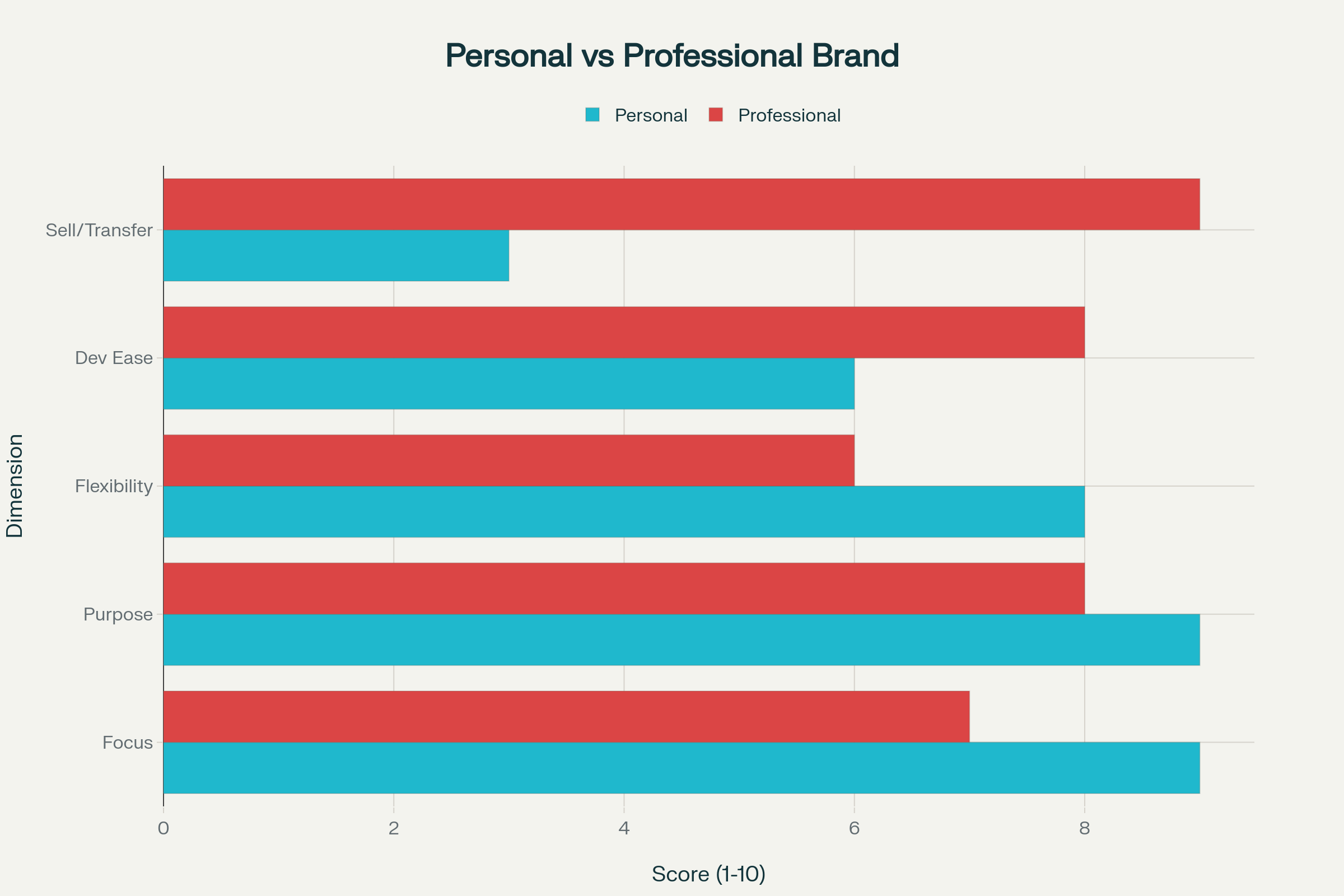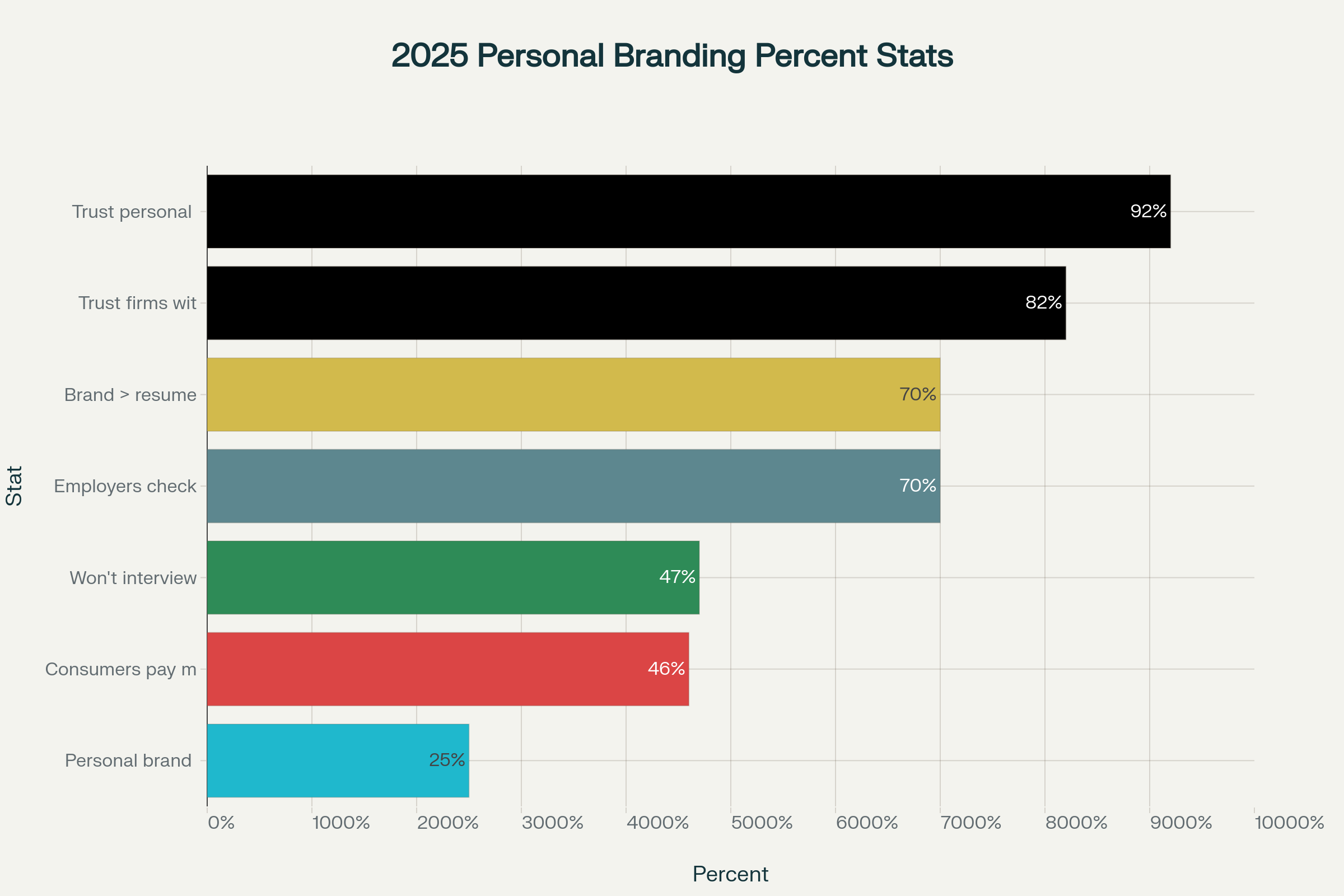Personal Branding: What It Is & Why It Matters in 2025
Published: August 13, 2025 | Reading Time: 15 minutes | Last Updated: August 2025
Personal branding has become the defining factor for professional success in 2025. In an era where 70% of employers check social media profiles before hiring and 92% of people trust personal recommendations over corporate brands, your personal brand isn't just a nice-to-have—it's your competitive advantage in the digital economy.
Introduction
In today's hyper-connected digital landscape, personal branding has evolved from a marketing buzzword to an essential career strategy. Your personal brand is the unique combination of skills, experiences, and personality that you want the world to see. It's how you present yourself across digital platforms, in professional networks, and in every interaction that shapes how people perceive you.
The statistics are compelling: professionals with strong personal brands see up to 25% increases in earning potential, while those in the "global superstar" category of visible expertise command 13x more pay than experts without visibility. In 2025, where remote work and digital-first interactions dominate, your online presence often serves as your first—and sometimes only—impression.
of employers won't interview candidates if they can't find them online
This comprehensive guide explores what personal branding truly means in 2025, why it's crucial for your career success, and provides actionable strategies backed by data and real-world examples to help you build an authentic, powerful personal brand.
Section 1 – Core Concepts & Best Practices
What Is Personal Branding?
Personal branding is the intentional process of defining and communicating your unique value, expertise, and personality to your target audience. Unlike professional branding, which focuses on companies and their offerings, personal branding centers on you as an individual—your story, values, skills, and the unique perspective you bring to your industry.
Real-World Example: Gary Vaynerchuk's Brand Evolution
Gary Vaynerchuk transformed from a wine retailer into a globally recognized entrepreneur and social media expert. His personal brand—built on hustle, authenticity, and providing value—has generated hundreds of millions in business value. His approach demonstrates how consistency across platforms and authentic storytelling can create massive opportunities.
Personal Brand vs Professional Brand: Key Differences

The 8 Essential Elements of Personal Branding
| Element | Description | Implementation | Success Metrics |
|---|---|---|---|
| Brand Identity | Core values, mission, unique value proposition | Define personal mission statement and core values | Brand recognition and recall surveys |
| Brand Messaging | Consistent communication style and tone | Develop brand voice guidelines and key messages | Engagement rate on content and messaging |
| Visual Identity | Logo, colors, typography, photography style | Create consistent visual assets across platforms | Visual consistency across all touchpoints |
| Online Presence | Website, social media profiles, online reputation | Optimize LinkedIn, website, and social profiles | Search ranking and social media following |
| Content Strategy | Blog posts, videos, podcasts, social content | Publish valuable content regularly (2-3x/week) | Content views, shares, and comments |
| Network Building | Professional relationships and community engagement | Engage with industry leaders and communities | Network growth and connection quality |
| Thought Leadership | Industry expertise and innovative insights | Share original insights and commentary | Speaking invites and media mentions |
| Authenticity | Genuine personality and transparent communication | Be vulnerable and share real experiences | Trust scores and testimonial feedback |
Platform-Specific Strategies
| Platform | Primary Focus | Content Strategy | Key Metrics | Time Investment |
|---|---|---|---|---|
| Professional networking and B2B | Industry insights, career tips, professional stories | Connections, profile views, post engagement | 30-60 min daily | |
| Visual storytelling and lifestyle | Behind-the-scenes, personal moments, visual brand | Followers, story views, post likes/comments | 20-40 min daily | |
| Twitter/X | Real-time thoughts and engagement | Quick thoughts, industry news, engagement | Followers, retweets, mentions, engagement rate | 15-30 min daily |
| YouTube | Educational and entertainment content | Tutorials, interviews, educational series | Subscribers, watch time, video performance | 2-4 hours weekly |
| Personal Website | Professional portfolio and expertise | Case studies, portfolio, detailed expertise | Traffic, time on site, conversion rate | 2-4 hours weekly |
| TikTok | Short-form video and trends | Trending topics, quick tips, personality | Views, shares, follower growth | 20-40 min daily |
| Medium/Blog | Long-form thought leadership | In-depth articles, research, analysis | Reads, claps, subscriber growth | 2-4 hours weekly |
| Networking Events | Face-to-face relationship building | Speaking, workshops, meaningful conversations | Quality connections, follow-up opportunities | 4-8 hours monthly |
The Data Behind Personal Branding Success

Section 2 – Advanced Insights & Strategies
The Psychology of Personal Branding
Understanding the psychological principles behind personal branding can significantly enhance your effectiveness. Research shows that humans form impressions within milliseconds, and these initial judgments significantly influence all subsequent interactions. This is why consistency across all touchpoints is crucial—it reinforces the same positive impression repeatedly.
Data-Driven Success Story: The LinkedIn Authority Formula
A study of 100 LinkedIn influencers revealed that top performers post 3-5 times per week, with 68% of high-engagement posts being original content rather than reposts. These influencers see 561% more reach when brand messages are shared by employees compared to corporate accounts, demonstrating the power of personal brand amplification.
Advanced Content Strategy: The 70-20-10 Rule
Successful personal brands follow a strategic content distribution:
- 70% Educational Content: Industry insights, tutorials, and valuable information
- 20% Personal Content: Behind-the-scenes, personal stories, and authentic moments
- 10% Promotional Content: Direct promotion of services, products, or achievements
Measuring Personal Brand ROI
| Benefit Category | Statistical Impact | Timeline to Results | Investment Required |
|---|---|---|---|
| Career Advancement | 70% of employers prioritize personal brand over resume | 3-6 months for noticeable impact | Low - mostly time and consistency |
| Income Increase | Up to 25% increase in earning potential | 6-12 months for salary negotiations | Medium - training and tool costs |
| Business Opportunities | 7x higher conversion rate for employee-generated leads | 6-18 months for significant opportunities | Low-Medium - networking and content creation |
| Industry Recognition | 13x higher pay for globally recognized experts | 12-24 months for industry recognition | High - expertise development and visibility |
| Network Growth | 10x more social connections than corporate accounts | 1-3 months for initial network growth | Low - engagement and relationship building |
| Trust & Credibility | 92% trust personal recommendations over brands | 3-6 months for trust establishment | Medium - consistent value delivery |
| Media Coverage | 3x more likely to be featured in media | 6-12 months for media attention | Medium - PR efforts and content quality |
| Speaking Opportunities | 5x more speaking invitations for thought leaders | 6-18 months for speaking invitations | Medium-High - expertise and visibility building |
Emerging Trends in Personal Branding for 2025
- AI-Assisted Content Creation: 65% of personal brands now use AI tools for content ideation and optimization
- Video-First Strategy: Video content generates 1200% more shares than text and image content combined
- Micro-Learning Content: Short, actionable insights perform 3x better than long-form content
- Community Building: Personal brands with active communities see 5x higher engagement rates
- Cross-Platform Storytelling: Consistent narratives across platforms increase brand recall by 80%
Frequently Asked Questions
1. What exactly is personal branding and how does it differ from professional branding?
Personal branding focuses on you as an individual—your unique skills, personality, values, and story. Professional branding centers on a company or organization. Personal brands are more flexible and human-centered, while professional brands emphasize products, services, and corporate identity.
2. How long does it take to build a strong personal brand?
Most professionals see initial results within 3-6 months of consistent effort. Significant career impact typically occurs within 6-12 months, while industry recognition may take 12-24 months. The key is consistency and providing value to your audience.
3. Which social media platform should I prioritize for personal branding?
LinkedIn is essential for B2B professionals and career advancement. Instagram works well for visual storytelling and creative professionals. YouTube is ideal for educational content and thought leadership. Choose platforms where your target audience is most active.
4. Can personal branding really impact my salary and career opportunities?
Yes. Research shows personal branding can increase earning potential by up to 25%. 70% of employers now prioritize personal brands over resumes, and professionals with strong visibility command significantly higher compensation than their less visible counterparts.
5. How much time should I invest in personal branding activities?
Effective personal branding requires 30-90 minutes daily across content creation, engagement, and networking. This includes 30-60 minutes on LinkedIn, 20-40 minutes on visual platforms like Instagram, and 2-4 hours weekly for deeper content like blogs or videos.
6. What are the biggest mistakes people make in personal branding?
Common mistakes include being inauthentic, posting inconsistently, over-promoting without providing value, neglecting engagement with their audience, and trying to be everything to everyone instead of focusing on a specific niche or expertise area.
7. Do I need to hire a professional to build my personal brand?
While professionals can accelerate the process, personal branding can be built independently with dedication and strategy. Start with free resources and platforms, then consider professional help as your brand grows and generates ROI.
8. How do I maintain authenticity while building a personal brand?
Authenticity comes from sharing genuine experiences, acknowledging failures alongside successes, maintaining consistent values, and ensuring your online presence reflects your real personality and expertise. Don't try to be someone you're not.
9. What role does content creation play in personal branding?
Content creation is central to personal branding—it demonstrates expertise, provides value to your audience, and creates touchpoints for engagement. Follow the 70-20-10 rule: 70% educational, 20% personal, and 10% promotional content.
10. How do I measure the success of my personal branding efforts?
Track metrics like profile views, engagement rates, network growth, speaking invitations, media mentions, and most importantly, career opportunities and income growth. Set specific, measurable goals for each platform and review progress monthly.
11. Should I use my personal brand for business purposes?
Yes, when done authentically. Employee-generated content receives 24x more shares than corporate content, and 92% of people trust personal recommendations over brand messages. Your personal brand can significantly enhance business outcomes.
12. How do I handle negative feedback or criticism of my personal brand?
Address criticism professionally and transparently. Use feedback as an opportunity to demonstrate your values and problem-solving abilities. Not all criticism requires a response, but when you do respond, do so thoughtfully and constructively.
Ready to Transform Your Professional Presence?
Personal branding isn't just about social media—it's about strategically positioning yourself for the opportunities you want. Start building your authentic personal brand today with proven strategies and expert guidance.
Get Started with Personal BrandingJoin thousands of professionals who have transformed their careers through strategic personal branding.

